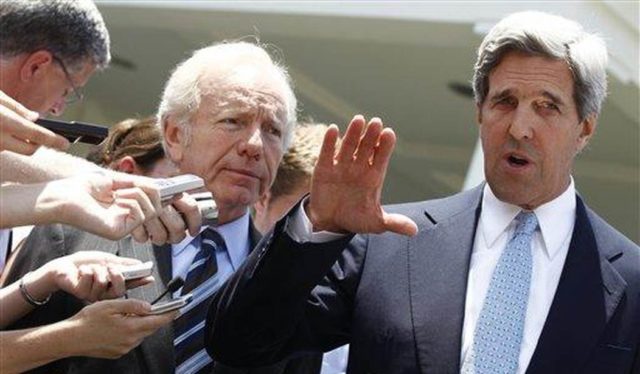Before it fades completely into history’s dustbin, one more word about this year’s cool kids’ World Economic Forum, otherwise known as the Debacle in Davos. Something good did emerge—the last lines of John Forbes Kerry’s self-written political obituary. Physically, the former U.S. senator, presidential candidate and secretary of state—President Joe Biden’s climate change czar—walks among us, an apparently healthy 79. Not walks, literally, but rather claims to travel commercially or militarily after past journeys by private jet and family yacht enlarged his carbon shoe size.
One can wish Kerry a life of continued cosseted indulgence—his wife is Maria Teresa Thierstein Simoes-Ferreira Heinz, widow of the late U.S. Senator John Heinz of globalized ketchup and herself head of the Heinz Family Philanthropies. One can wave goodbye to our climate czar while insisting he just shut up and leave.
After all, his entire public career has been built on being wrong influentially.
Example: In Davos, Kerry insisted that slowing or halting global warming equates to winning World War II. That implies a federal-government-led militarization of the economy to stamp out fossil fuels, with someone like himself as supreme commander of green forces.
He did not mention that China and India emit far more CO2 than the United States and Europe combined. Decarbonizing energy sources should be done, Kerry told fellow global mandarins—he actually referred to his Davos mates as “extraordinary,” a “select group of human beings”—by throwing U.S. taxpayers’ “money, money, money, money, money, money, money” at poor countries. He ignored emissions-free nuclear power.
Example: Kerry first made his name as a leader of Vietnam Veterans Against the War. At 27, and a former U.S. Navy lieutenant, he testified before the Senate Foreign Relations Committee in 1971. Kerry said VVAW had collected testimony from 150 vets (2.7 million served in Vietnam) that at times they personally had raped, tortured, beheaded, and “randomly shot at civilians, razed villages in fashion reminiscent of Genghis Khan ….”
He asserted that South Vietnamese didn’t distinguish between communism and capitalism and their army often wouldn’t fight. Yet after America withdrew most ground forces, Saigon, with U.S. air power, defeated the large-scale North Vietnamese “Easter Offensive” in 1972.
Kerry also repeated that black GIs suffered casualties at a higher rate than the general population. In fact, during the war years, African Americans comprised 11.5 percent of the U.S. population; war-related fatalities among black enlisted personnel and officers totaled 12.5 percent.
Example: From his erroneous but well-received start before anti-war senators, Kerry failed upward, winning election as Massachusetts’ lieutenant-governor in 1982, then the first of three U.S. Senate victories in 1984. In Congress and as Democratic presidential nominee in 2004, Kerry decried government deficits. That well-founded concern evaporated as he backed the presidential bids of Barack Obama in 2008 and Biden in 2020.
Example: As secretary of state in Obama’s second term, Kerry doggedly negotiated the 2015 Iran nuclear deal, which his boss sold as the only alternative to war. In reality, the 2015 Joint Comprehensive Plan of Action placed temporary restrictions on Tehran’s drive for big bang weapons in exchange for sanctions relief and economic enrichment of the Islamic republic. It said nothing about the mullahs’ development of ballistic missiles or role as the world’s leading sponsors of state terrorism.
President Donald Trump withdrew from the deal in 2018, and the United States imposed tight economic sanctions on Tehran. President Biden waived restrictions in 2022. Iran, which showed little interest in re-entering the 2015 agreement, now reportedly has enough enriched uranium for at least one nuclear bomb. Meanwhile, it supplies Russia with drones to use against Ukraine.
Example: Also as secretary of state, Kerry in 2013-2014 made what then-Israeli Defense Minister Moshe Ya’alon described as an “inexplicably obsessive” attempt to restart Israeli-Palestinian talks. Jerusalem freed 78 terrorists as a “confidence-building” concession, but Palestinian leaders refused to recognize Israel as a Jewish state or accept an Israeli security presence in the Jordan Valley.
In 2016, Kerry declared “there will be no advance and separate peace with [Israel and] the Arab world without the Palestinian process and Palestinian peace. Everybody needs to understand that.” In 2020, the Trump administration brokered peace agreements between Israel, Bahrain, the United Arab Emirates, Morocco and Sudan without Palestinian involvement.
After the climate czar’s Davos gushing, a friend should repeat to Kerry Oliver Cromwell’s dissolution of the Long Parliament in 1653: “You have sat here too long for any good you have been doing lately. … In the name of God, go!”






